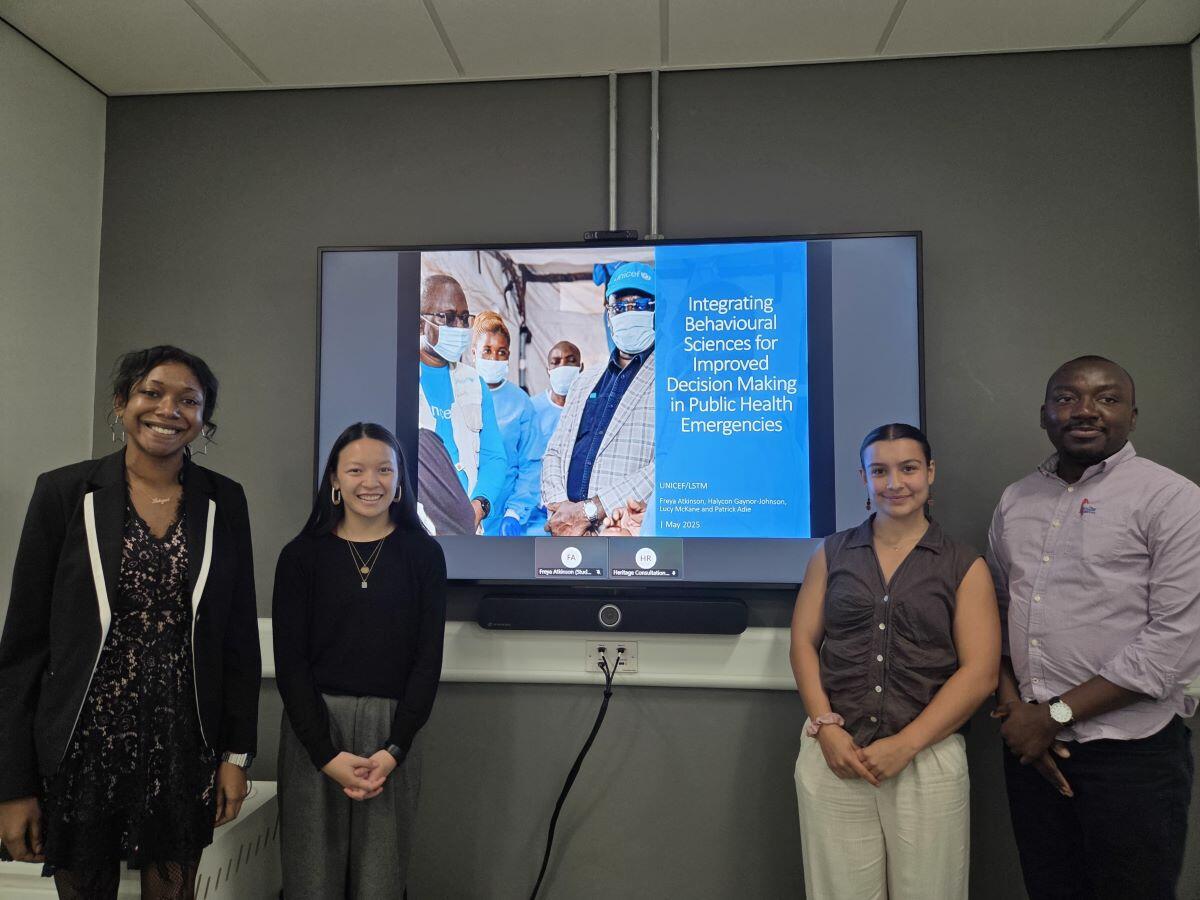
LSTM students have presented their research into how behavioural science can aid public health emergency and humanitarian response to experts at UNICEF.
A group of four students from the MSc Humanitarian Studies and Master’s in Public Health prepared a report as part of a professional skills module that paired them with a humanitarian NGO or international organisation to investigate a real-world issue.
The UNICEF team were so impressed by the work produced by students Freya Atkinson, Lucy McKane, Halcyon Gaynor-Johnson and Adie Adie that the group were invited to present their findings to a wider group of UNICEF workers.
The team interviewed senior staff across multiple NGOs, conducted a literature review on behavioural science, and developed a set of innovative evaluation tools to improve individual, organisational and community-focused decision-making.
Mariana Palavra, Social and Behavioural Change Specialist – Emergency Response Team at UNICEF, said: “I cannot think of another better academic partner than the first institution in the world dedicated to research and teaching in the field of tropical medicine. This partnership with LSTM gives UNICEF teams the opportunity to learn and put in practice...translational research and collaborate with future leaders in global health.
“LSTM and UNICEF share common values and work, namely through the delivery of effective interventions which improve human health and are relevant to the most vulnerable communities, which is aligned with the work of Social and Behaviour Change and Public Health Emergency teams.
“This provides students with an opportunity to apply the skills they learn at LSTM to a ‘real-world’ problem and gives UNICEF a chance to harness those skills to advance its own organisational objectives. Such collaboration supports UNICEF’s goal to strengthen its current approach to use evidence-based social and behavioural evidence and data to inform its programming, particularly in the context of Public Health Emergencies and humanitarian crises.
“Such research projects from LSTM students help UNICEF tailoring interventions and adapt community engagement models used in humanitarian contexts to early recovery programme settings, design community engagement initiatives addressing the impacts of PHE and other emergency crisis.”
The group of LSTM students said: "The consultancy project module was an exciting opportunity, offering real world experience into the public health and humanitarian field. To work with an organisation as big as UNICEF was a daunting but inspiring task that helped us to further develop both our research and project management skills.
“Over the seven months we planned, developed and implemented qualitative research aimed at exploring how behavioural science can be used to improve decision making in public health emergency response in the humanitarian setting. This involved key informant interviews with senior staff across multiple NGOs to identify key challenges currently faced within this setting. This data, alongside a literature review focused on behavioural science, was then used to develop key evaluation tools focused at improving individual, organisational and community focused decision making.
“Overall, the module offered an opportunity to work with other students, to combine our knowledge and backgrounds to produce a consultancy report we are truly proud of."
UNICEF said that the students’ initial insights will be the foundation for a broader set of research activities that will try to find confirmatory evidence of their initial findings, and will subsequently contribute to a broader framework and policy recommendations on how to think about decision-making in emergency settings.
The project is just one example of the valuable professional experiences that students are able to enjoy on the Humanitarian Studies and Master’s in Public Health programmes. Other project teams have worked alongside MSF, Action Against Hunger, International Medical Corps, ACTED, UNHCR and other organisations on projects with similar real-world impact.
Find out more about postgraduate study at LSTM.